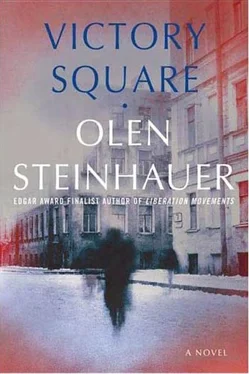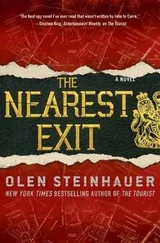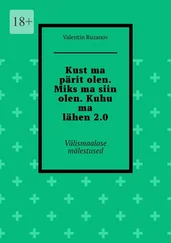Olen Steinhauer - Victory Square
Здесь есть возможность читать онлайн «Olen Steinhauer - Victory Square» весь текст электронной книги совершенно бесплатно (целиком полную версию без сокращений). В некоторых случаях можно слушать аудио, скачать через торрент в формате fb2 и присутствует краткое содержание. Жанр: Политический детектив, на английском языке. Описание произведения, (предисловие) а так же отзывы посетителей доступны на портале библиотеки ЛибКат.
- Название:Victory Square
- Автор:
- Жанр:
- Год:неизвестен
- ISBN:нет данных
- Рейтинг книги:3 / 5. Голосов: 1
-
Избранное:Добавить в избранное
- Отзывы:
-
Ваша оценка:
- 60
- 1
- 2
- 3
- 4
- 5
Victory Square: краткое содержание, описание и аннотация
Предлагаем к чтению аннотацию, описание, краткое содержание или предисловие (зависит от того, что написал сам автор книги «Victory Square»). Если вы не нашли необходимую информацию о книге — напишите в комментариях, мы постараемся отыскать её.
Victory Square — читать онлайн бесплатно полную книгу (весь текст) целиком
Ниже представлен текст книги, разбитый по страницам. Система сохранения места последней прочитанной страницы, позволяет с удобством читать онлайн бесплатно книгу «Victory Square», без необходимости каждый раз заново искать на чём Вы остановились. Поставьте закладку, и сможете в любой момент перейти на страницу, на которой закончили чтение.
Интервал:
Закладка:
“Think he has a say in it?” She turned Sanja to face her, switching to baby talk: “No, no! Daddy doesn’t have any say!” Sanja didn’t seem to have an opinion one way or the other.
We’d just passed the last of the towers when the roadblock appeared. Two Militia cars were parked in the grass, and a makeshift gate-a long tangle of razor wire-had been stretched across the road. As I slowed to a stop, a big militiaman in a regulation blue overcoat tossed away a cigarette and came over to my window. I rolled it down, letting in the cold. He had fat sideburns growing from under his cap, and half his face was sunburned. “Where you going?”
“Tisavar. What’s this?”
“Turn around and head back. Traffic’s stopped today.”
I handed over my Militia certificate. He cocked his head as he read it, then pushed back his cap with a knuckle. “Sorry about that, Comrade Chief.” He didn’t seem very sorry. “Orders from the top.”
“What does that mean?”
He squinted and rocked on his heels. “You know. Central Committee.”
“To keep everyone in the Capital?”
He nodded, then noticed Agota and Sanja. He gave them a smile.
“Trains are down, too?”
“Most,” he said. “First train they cut was the twelve thirty to Patak.” He tapped the side of his nose. “I think we all know what it’s about.”
“But I can go through.”
“Sure,” he said. “You’re not going to Patak, right?”
“I told you. Tisavar.”
He touched the brim of his cap, then stepped back and waved us on. Two younger militiamen with thick gloves dragged the razor wire aside so we could pass.
We didn’t talk about the roadblock, or the fact that suddenly the Capital had become a prison. It had happened before, when the Central Committee overreacted to a bomb that destroyed a fertilizer plant in Krosno, back on November fifth-the thirty-second anniversary of the short-lived 1956 general strike that, in the end, led to Agota’s father’s internal exile.
After two days, though, the roadblocks had been removed, and the government never spoke of it again. Perhaps Tomiak Pankov thought we would forget.
We reached Tisavar a little before three. Ferenc and I, whenever something required a private meeting, always came here, to a point just within the ring of his allowed movement, an hour south of the Capital, just before Kisvarda. Before the Great Patriotic War, Tisavar had been a tiny Jewish-Slav enclave that had survived and even prospered under the Austro-Hungarian government as a market town for the farmers in the nearby region. In the thirties, the mayor decided it was time for a change, and he began lobbying the between-wars government for subsidies to start building cooperative granaries. The government agreed, but before the money could make it there, the Germans marched in. Then Tisavar disappeared.
The Wehrmacht appeared in May 1939, having quickly overrun our little army. My father died in those short battles and was soon followed by my mother. At the time, I was living in the south, in Ruscova, with my grandparents, who had fled the soldiers in the Capital. The Occupation, for me, was largely about boredom. I was an anxious, too ambitious boy surrounded by dull farmers. Up around Tisavar, though, the Nazi presence was felt strongly. Soldiers patrolled the streets, and officers took over the administrative house, controlling the flow of money and property and Jews.
The region was governed by Major General Karloff Messerstein, a delinquent from Thuringen who had joined the Nazi Party during its beer-hall days. He administered the region as if it were his private fiefdom, and, perhaps inevitably, some of the headstrong Tisavar boys used munitions left over from our short-lived war to blow up Messerstein’s car in 1942.
The major general survived with burns and a broken leg, and from his hospital bed directed the retribution.
Early on in the Occupation, the Germans had enlisted the help of malcontents from our Ukrainian population. These young men had been promised that, once the war was won, the eastern half of our country (including the Capital) would be returned to the Ukraine as a state within the greater German Reich. The fools believed it, because they wanted to. Messerstein decided that, given their local knowledge and natural animosity for these westerners, his Ukrainian recruits would be ideal for the job.
They first emptied the houses and led the townsfolk to what would later be called Anti-Fascism Hill, on the north side of town. There, over the space of two days, the entire population was executed and buried. Then, using a tank borrowed from a nearby Panzer division, they destroyed the stone administration buildings, then systematically burned every house. As an added touch, Major General Karloff Messerstein arrived on crutches to personally supervise the delivery of two truckloads of Hungarian salt, which were spread over the embers.
All of this was in our history books, and people in the region never forgave the Ukrainian minority its role in the event. The irony, which the textbooks never mentioned, was that a week after the massacre, Messerstein died naturally of a cerebral hemorrhage.
Now, all that was left was a memorial in the middle of a swath of barren earth. It was placed here by Mihai during a 1951 ceremony, filmed by camera crews from all over the world. A statement on a bronze plaque attached to a
stone pedestal, followed by a few lines from our national poet, Rikard Pasha: HERE MARKS THE SPOT WHERE TISAVAR WAS DESTROYED BY THE FASCIST MENACE ON 8 OCTOBER 1942.
A world like leaves of the impossible creation from God’s mind.
All we can hope for is a dream made clear before we die.
No one, not even Ferenc, had ever been able to tell me what those two lines of verse were supposed to mean.
He was waiting for us in front of the plaque, gloved hands clasped behind his big form, gazing down. Ferenc was just as huge as he’d always been, and though he’d recently turned seventy, he still didn’t look like a writer; he looked like a retired thug. When we parked, he turned to face us, and I noticed his lumpy nose was a little bigger and redder than before. When he saw his daughter and granddaughter get out of the car, he lumbered over to hug them, grinning madly.
Perhaps unconsciously, Agota had chosen in Bernard a man who was just like her father-huge, moody, and surprisingly astute at times-and this was perhaps why the two men couldn’t get along. They hated to see themselves reflected.
When we shook hands, I smelled palinka on him and wondered if he was drunk. “Still trying to figure that out?”
“Mihai,” he said, nodding at the plaque. “He was a mysterious man.”
“Let’s walk.”
Ferenc handed his keys to Agota and asked her to wait in his beat-up Russian flatbed truck. We walked across the salt-dead ground through the cold wind from Anti-Fascism Hill, which was dotted with crosses and bundles of dead flowers. “So you’ve got a lieutenant general’s corpse,” he said.
“Poisoned. Someone laced his cocaine with pure heroin.”
“Ballsy.”
I agreed. “By now, Feder has filed his autopsy, so it’s official. I don’t have much choice-I’ll have to press on with the investigation. I just need to figure out how I’m going to do it.”
“And you think I can help?”
I looked at him, hands deep in my pockets. The wind was making my eyes water. “You’re at the center of things these days. You’d know if someone wanted Kolev dead.”
“We don’t want people dead,” he said. “Those are the kinds of people we’re fighting.”
“Remember fifty-six?” I said.
He frowned. “What about it?”
“You may not want to execute anyone, but that doesn’t mean someone on the fringe hasn’t decided to go that route.”
Читать дальшеИнтервал:
Закладка:
Похожие книги на «Victory Square»
Представляем Вашему вниманию похожие книги на «Victory Square» списком для выбора. Мы отобрали схожую по названию и смыслу литературу в надежде предоставить читателям больше вариантов отыскать новые, интересные, ещё непрочитанные произведения.
Обсуждение, отзывы о книге «Victory Square» и просто собственные мнения читателей. Оставьте ваши комментарии, напишите, что Вы думаете о произведении, его смысле или главных героях. Укажите что конкретно понравилось, а что нет, и почему Вы так считаете.












